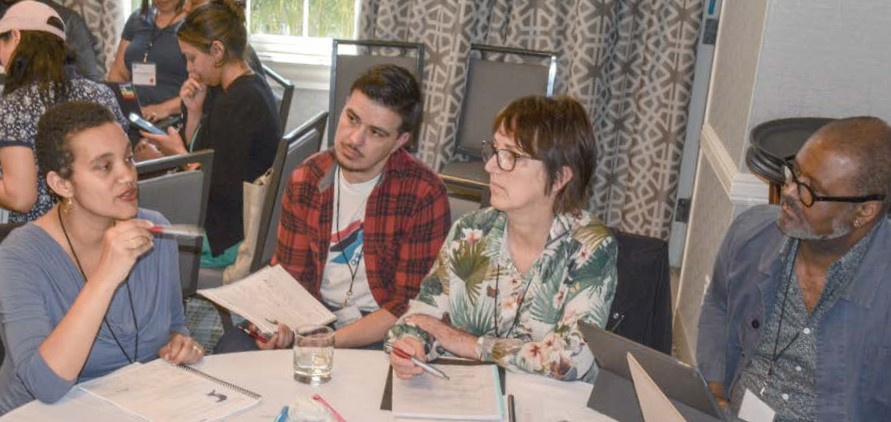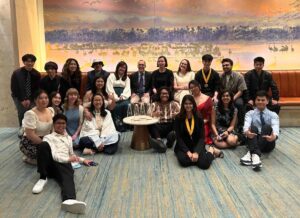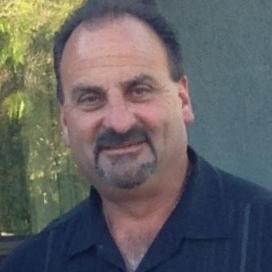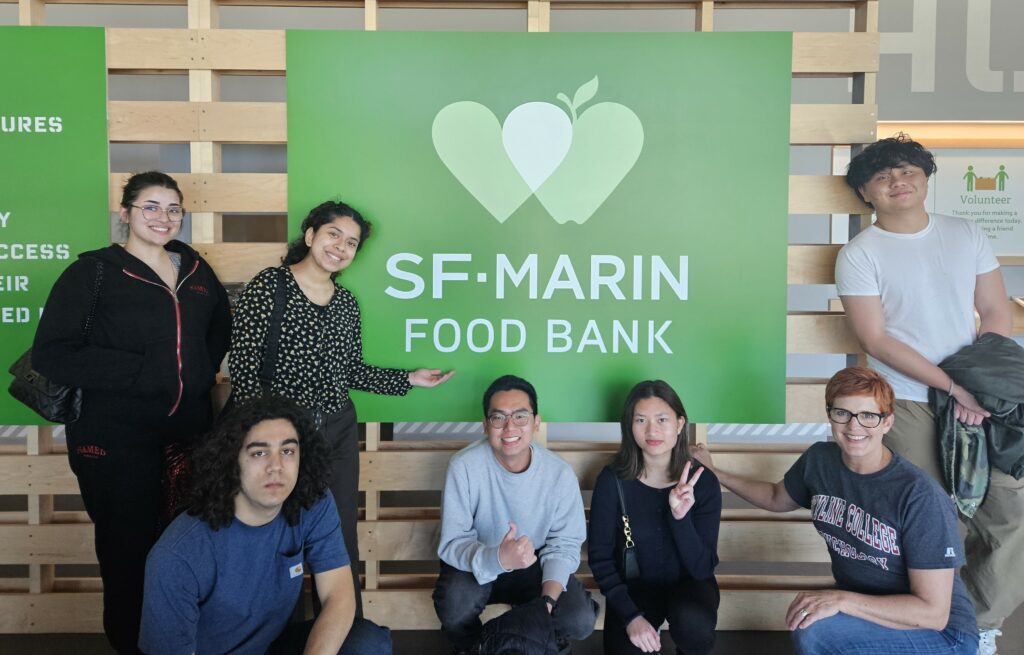 On April 17-19, 2019, the Equity Institute (EI) hosted its inaugural equity academy, The Anatomy of a Transformative Course: Critical Competencies for Student Success at the San Mateo Marriott. Equity academies are intensive multi-day professional development experiences introducing participants to baseline concepts, interrogating data, and mapping implementation strategies for participants to focus on creating strategic institutional responses to issues around race, gender, and equity. In the inaugural academy, 17 California community colleges sent teams of 10 people representing faculty, instructional support staff, academic deans, and vice presidents of instruction to learn new ideas, strategies, and resources that advance student success.
On April 17-19, 2019, the Equity Institute (EI) hosted its inaugural equity academy, The Anatomy of a Transformative Course: Critical Competencies for Student Success at the San Mateo Marriott. Equity academies are intensive multi-day professional development experiences introducing participants to baseline concepts, interrogating data, and mapping implementation strategies for participants to focus on creating strategic institutional responses to issues around race, gender, and equity. In the inaugural academy, 17 California community colleges sent teams of 10 people representing faculty, instructional support staff, academic deans, and vice presidents of instruction to learn new ideas, strategies, and resources that advance student success.
Day one of the academy opened with keynote speaker, Dr. Regina Stanback Stroud, President Emerita of Skyline College, consultant, and an influential voice education with a 30+ year career in the California community colleges. Her message called for faculty to be courageous, committed, and work collaboratively to show up differently for our students. She emphasized the agency and influence faculty and institutional leaders yield to impact students’ lives stating, “You are the people who get to shape the education of the students that are in your classrooms…use your power, don’t waste it. If you’re in a position to allocate resources, allocate resources. If you’re in a position to remove barriers, remove barriers…” Following the keynote, EI Executive Director, Lasana O. Hotep welcomed participants to the academy introducing them to the T3 Framework, a practical framework developed by the EI that encourages educators to measure the foundational aspects of their course by critiquing the lens under which the tools were developed. His welcome provided context around the purpose of the academy and the journey participants will embark on.
Throughout the academy, teams worked collaboratively in sessions facilitated by instructional faculty, staff, and administrators at Skyline College. In the sessions, teams engaged in experiential learning activities and discussions around how to approach their course syllabi, design lesson plans, and develop pedagogical and grading practices through a lens of equity. Team members also received a guidebook developed by the Equity Institute that provided reference materials to the content taught in the sessions, activities participants work on when they return to their institutions and resources.
Day two of the academy featured a lunchtime conversation with Kenyatta Weathersby, Professor of Statistics, and Jessica Hurless, Professor of Communication Studies of Skyline College. In their conversation, Weathersby shared how he used the Flint Water Crisis as a model and framework for students to learn statistical concepts and develop their own experiences and projects. This approach came from a desire to have the course content connect to students’ lives. He said, “ I was always thinking about what can I do to make students excited? What can I do to get them to put the pencil in their hand?”
The academy culminated with keynote speaker, Dr. Pedro Noguera, an award-winning educator, author, and activist. He opened his message sharing, “I had no idea how deep you were going in this work…as you’ve heard, I’ve taught at Berkeley, at Harvard, at NYU, and now UCLA, none of those universities has ever done what you’re doing. Not one. Not one.” Dr. Noguera talked about how effective faculty and transformative instructors teach students in a manner that revives their curiosity about the world, helps build agency, and instills self-confidence. He said, “You’ve been focused on equity the last couple of days and so it’s really important to make it clear what this is about. It’s about giving our students what they need to be successful recognizing the academic needs and social needs are interconnected. Following the closing keynote, academy participant, Nikki Dequin who serves as Academic President at Gavilan College shared, “This work is ultimately going to lead to student success….it’s helping our bettering ourselves and what we’re doing to better our students. That’s the value in itself. As a result of this, our students are going to be more successful.”
On June 12-14, 2019, the EI hosted the academy, Counseling in the Era of Equity: Critical Competencies for Student Success. The experience created a space for counselors to engage in a process that shifts their approach from “fixing” students to empowering students, exposed them to innovative and practical pedagogical counseling practices, develop a transformative College Success course outline, and learn how this work can be applied within a Guided Pathways framework. For this academy, 18 California Community Colleges sent teams of counselors, counseling deans, and vice presidents of student services to gain information, ideas and develop strategies to move their Counseling departments and colleges towards an equity-minded approach.
Day one opened with keynote speaker, Dr. Darrick Smith, a Consultant and Professor of Education at the University of San Francisco. His message called for a shift in consciousness for community colleges to re-think what it means to advise and counsel students. He said, “We must make our instruction and our assistance more directly relevant to the issues that they face highlighting the complexity of their realities on a daily basis and empowering and teaching them to confront both their daily realities and the institution at the same time.” He explained that the duty of a counselor is not merely about matriculation but developing a critical lens and counseling practices that empower students to understand, learn, and move through the institution while also developing skills that equip them with skills to navigate their own challenges and experiences.
The four areas of counseling addressed in the sessions were the identity of a counselor, counseling pedagogies, how to develop a transformative student success course and 1-on-1 appointments, and how these efforts can be executed collectively as a college through the Guided Pathways framework. Teams referred to their counseling guidebook while engaging in the sessions and worked with their groups to identity how they want to bring the ideas back to their counseling departments, guided pathways committees and college leadership.
Day two of the academy also offered a lunchtime conversation with Michelle Batista, Director of Student Support and Nate Nevado, Counseling Faculty at Skyline College. In this conversation, Nate Nevado spoke about his counseling approach using Hip Hop Pedagogy and the elements of hip hop as a pedagogical tool to better connect with students. The academy closed with keynote speaker, Dr. Michael Benitez, nationally acclaimed scholar-practitioner and Dean of Diversity and Inclusion and Chief Diversity at the University of Puget Sound. Academy participant, Juztino, a Counselor at Chabot College shared, “We were inspired to come here by our previous group that came to your first academy. The knowledge, skills and tools they came back with already have been transformative at our college…I was really appreciative to be here. It’s been a super meaningful and humbling experience for me.”
Article by Katrina Pantig






